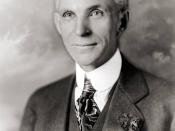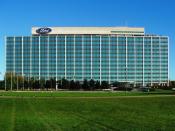'Is good management essential in achieving organizational goals of organizational efficiency, effectiveness and productivity?'
Management is the process of achieving organisational goals through the four functions of management, planning, organising, leading and controlling (Davidson, 2006: 5). For the reason that management involved with such variety of activities that basically would affect the proper function and the flow of the organisation; consequently, the standard of the management is the direct factor hindering the efficiency, effectiveness and productivity in the organisation.
Efficiency means 'accomplishing those goals within time constraints' and effectiveness means the 'accomplishment of the organisation's goals' (Seward and Dein, 2005:6). This is asserted by Stoner et al. (1985) who comments that while efficiency is 'doing things right', effectiveness is 'doing the right things'. Furthermore, efficiency, effectiveness and productivity are important and play a big part in any organisation. They make up most of any organisation that has been created.
In the other words, it can be said that one of the purposes of management is to contribute to the efficiency and effectiveness of an organisation. Thus efficiency and effectiveness emphasize the basic purpose of management to achieve organisational goals.
As mentioned before, management is a multi-layer and complicated process. Managerial personnel or department might often encounter challenges when they performing certain activities and tried to coordinate the work of others effectively and efficiently (Robbins, 2006: 10). To solve those challenges encountered, strategies need to be imposed appropriately to ensure the efficiency and effectiveness in the organisation. The following article will look into the importance of good management in achieving organisational goals and organisational efficiency, effectiveness and productivity. McDonald's, Ford motor and ANZ bank will be used as case studies to illustrate the argument.
The Corporation of McDonald's is the world's largest successful chain of fast food restaurants. McDonald's is a successful fast food chain due to good leadership skills which is the key to management productivity (KPMG, 2009: 2). This is one of the reasons why McDonald's is the best in the world and has been for many years.
Globalisation is one of the contemporary challenges for managers in this particular organisation (Davidson, 2006: 58). Because of globalisation, it also interrelates to cultural diversity since there are many McDonald's located around the world.
Another important management challenge that needs to be mentioned is quality. Quality is important because it may be a basis for competition, improve productivity by cutting waste and rework and lowers costs (Davidson, 2006: 58). For instance, employees at McDonald's are different all over the world (employees making burgers differently), but still maintain the quality of the product. Hence, an effective managerial strategy is to ensure the same standard is kept all over the world.
Also, good research about each country before they open up is needed, since McDonald's is global, they need to modify their products to cater for local tastes and food values (Lexicon, 2005). For example, Muslim countries like Brunei, bacon is not served in burgers or any other product, as pork is prohibited in Muslim country.
Furthermore, to accomplish their organisational goals, McDonald's have constant training for employees. In 2001, Guy Russo CEO of McDonald's Australia (Campling, 2005: 411) introduced a program where students could complete an accredited certificate while working at McDonald's. 'McDonald's spends more than 16 million dollars each year on training its 56,000 employees across Australia. In that same year, McDonald's Australia earned profits of 128 million dollars on sales' (Campling, 2005: 411). By only using 16 million on training, which lead to profits of 128 million, these figures have proven that the management skills in training are very important. As a result, a more effective and efficient organisational structure has formed.
Through further research, McDonald's employees work in different parts of the workplace. For example, one employee is making burgers and another serving at the counter. This is very efficient as each employee has a specific role. This enhances productivity.
Motivation, leadership, group processes and communication are important as they enhance productivity.
The Ford Motor Company is a global automotive industry. It manufactures and distributes vehicles across the world. The Firm also owns other automobile brands which include Volvo and Astin Martin (Ford, 2008: 1). Ford is currently the fourth-largest automaker in the world based on number of vehicles sold annually and is now a market leader in innovation and technology (Ford, 2010). One of the management challenges that Ford Motor faces is it must be prepared to address the fierce competition from other companies within and outside the country.
In order to compete, the company must be ahead on cost, quality and service. Also Ford has to constantly innovate through research and development to create new products. This strategy has enabled the organisation to achieve its 'effective' goal of survival and profitability by allowing it to compete not only on the price but also design and quality. This receives academic support from Stoner et al. (1985) who states that management requires performance that is both efficient and effective.
Another management challenge for Ford is to cut costs of its workforce and raw materials. In order to cut costs, Ford used the "Just in Time" (JIT) management strategy in the manufacturing of the Ford KA (Susanto, 2002-2003).The aims of JIT are obtaining low-cost high quality products and on-time production as well as eliminating waste and over stocking of inventory. JIT has however its own problems. Ford has cleverly used the right managerial strategies by reducing the problems in relation to its supply chain.
In order to further lower cost, Ford outsourced its operations to developing nations like China, India and South-East Asian countries where labour is cheap and plentiful (Tonelson, 2000).
ANZ is one of the largest companies in Australia and New Zealand and a major international banking and financial services group. It is one of the top fifty banks in the world (ANZ, 2010).
Good Management of a bank is crucial in reaching its objectives of organisational efficiency, effectiveness and productivity.
The management challenges (problems) of a bank include well controlled cost centres, product quality, service quality, happy customers and share holders.
Cost centres include good quality, experienced and well trained employees, up-to-date technologies such as computers, ATMs, specialised banking software, internet banking, etc.
Product quality includes competitive range of accounts, mortgages etc. Good quality bank employees must be properly trained and experienced personnel to provide good customer services.
An example of management is to reduce cost of workers. Using the "Flattening the hierarchy" theme (Davidson, 2006: 58) to downsize the workforce to cut cost is not always a clever method because it could remove the quality employees. This will affect efficiency and productivity of the bank.
One of the management strategies of the bank is to ensure customer service is appropriate by considering the diversity of the customers. For instance, through research, it is found to be very important to employ Chinese bank tellers and managers in China Towns to ensure customers are well served to achieve customer satisfaction.
For example in ANZ, experienced managers use human skills daily to gauge employee ability and suitability in order to lead and organise them in an effective and efficient way (Samson & Daft, 2006). Hence, the importance of appropriate human skills which are both efficient and effective for management to work with in order to achieve organisation goals. Susie Babani quotes 'We are creating a diverse and inclusive workplace for our people. Being an organisation that regards an individual's gender, background, age, disability or sexuality as an asset is essential if we are to attract the best people, innovate, identify new business opportunities and grow in our region' (ANZ, 2008).This being said will create a better workforce and improve productivity in the organisation.
A sound management strategy is to have good clear organisational and management guidelines for workers.
Also service economy relies more and more on technology (Davidson, 2006: 58). In order to reduce cost and increase efficiency and effectiveness banks encourage customers to use online banking instead of going to the bank itself.
In conclusion, it is shown that to achieve good management, organisation needs to be able to achieve organisational goals by creating efficiency, effectiveness and productivity throughout the organisations. Different organisations have different management challenges and managerial strategies. Therefore to survive in the current competitive environment, organisations need to adapt and future problems and overcome them with solutions.
Word count : 1,345.
References:
ANZ (2008), ANZ Annual Report, viewed on the 22nd March, 2010, <http://www.anz.com/aus/annual-report-2008/corporate-responsibility/people.asp>.
ANZ (2010), 'History of ANZ' in ANZ Corporate Information, viewed on the 22nd Mach, 2010, <http://www.anz.com/australia/aboutanz/corporateinformation/historyofanz/default.asp>.
ANZ (2010), ANZ, viewed on the 19th March, 2010, <http://www.anz.com>.
Campling, John Trevor. (2006), Management : an Asia-Pacific perspective, Milton; Qld; John Wiley & Sons.
Davidson P., A. Simon., P. Woods. & R. W. Griffin. (2009), Management : core concepts and applications, Australia; John Wiley & Sons.
Ford (2008), Ford Annual Report, viewed on the 21st March, 2010, <http://www.ford.com/doc/2008_annual_report.pdf>.
Ford Motor Company of Australia Limited (2010), ' Innovation & Technology' , in Ford, viewed on 21st March, 2010, <http://www.ford.com.au/servlet/ContentServer?cid=1178874234593&pagename=Page&c=DFYPage&site=FOA>.
KPMG (2009), ' How training made McDonald's Australia a leader', The Boardroom Report, Vol.7 (15), pp 1-2.
Lexicon (2005), 'McDonald's', in McDonald's- everything on McDonald's, viewed on the 20th March, 2010, < http://www.spiritus-temporis.com/mcdonald-s/>.
Robbins, S., P Bergman, R Stagg, I & Coulter, M. (2006), Management, Australia;Sydney; Prentice Hall.
Samson, D. & Daft, R.L. (2003), The Fundamentals of Management, Pacific Rim Edition, Thomson, Victoria, Australia.
Seward, Jeremy., Tom Dein. (2005), Australian Human resources management , Australia; McGrawHill.
Stoner, J.A.F., Collins, R.R. & Yetton, P.W. (1985) , Management in Australia, Australia: Sydney; Prentice Hall.
Susanto, Lukman. (2003), Just in Time in Ford, viewed on 20th March, 2010, < http://www.susanto.id.au/papers/JITFORD.asp>.
Tonelson, A. (2000), The race to the bottom: why a worldwide worker surplus and uncontrolled free trade are sinking American living standards, USA; Westview Press.
� PAGE \* MERGEFORMAT �2�


